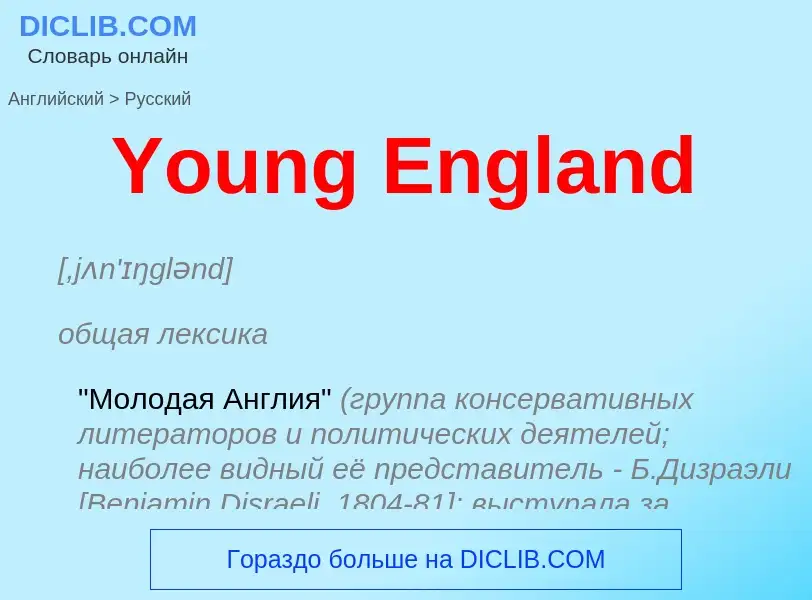Vertaling en analyse van woorden door kunstmatige intelligentie
Op deze pagina kunt u een gedetailleerde analyse krijgen van een woord of zin, geproduceerd met behulp van de beste kunstmatige intelligentietechnologie tot nu toe:
- hoe het woord wordt gebruikt
- gebruiksfrequentie
- het wordt vaker gebruikt in mondelinge of schriftelijke toespraken
- opties voor woordvertaling
- Gebruiksvoorbeelden (meerdere zinnen met vertaling)
- etymologie
Young England - vertaling naar russisch
[,jʌn'ɪŋglənd]
общая лексика
"Молодая Англия" (группа консервативных литераторов и политических деятелей; наиболее видный её представитель - Б.Дизраэли [Benjamin Disraeli, 1804-81]; выступала за восстановление привилегий земельной аристократии, против уступок промышленной буржуазии. Существовала с 1841 по 1848)
математика
граф Юнга
схема Юнга
[,jʌŋ'vɪk]
общая лексика
"Янг Вик" (молодёжный театр. Основан в 1970)
здание театра находится недалеко от театра "Олд Вик" [Old Vic]; по нему и назван
Смотрите также
Definitie
Wikipedia
Young England was a Victorian era political group with a political message based on an idealised feudalism: an absolute monarch and a strong Established Church, with the philanthropy of noblesse oblige as the basis for its paternalistic form of social organisation. For the most part, its unofficial membership was confined to a splinter group of Tory aristocrats who had attended public school and university together, among them George Smythe, Lord John Manners, Henry Thomas Hope and Alexander Baillie-Cochrane. The group's leader and figurehead was Benjamin Disraeli, who bore the distinction of having neither an aristocratic background nor an Eton, Oxford, or Cambridge education. Young England promulgated a conservative and romantic species of social Toryism.
Richard Monckton Milnes is credited with coining the name Young England, a name which suggested a relationship between Young England and the mid-century groups Young Ireland, Young Italy, Young Germany, and Young Europe. However, these political organisations, while nationalistic like Young England, commanded considerable popular support and (following lead Young Italy organiser Giuseppe Mazzini) were socially liberal and politically egalitarian and broadly republican.


![Young Vic Theatre, [[Southwark]] Young Vic Theatre, [[Southwark]]](https://commons.wikimedia.org/wiki/Special:FilePath/Young Vic Theatre, Southwark.jpg?width=200)
